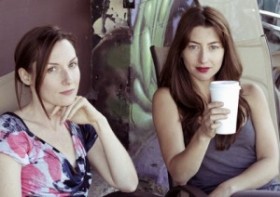Jack Plotnick has spent the last decade as a working actor in Los Angeles. In film, he has appeared opposite Ben Stiller in MEET THE FOCKERS, Ian McKellen in GODS AND MONSTERS, Renee Zelwegger in DOWN WITH LOVE, and Sally Field in SAY IT ISN’T SO. Jack was a series regular and supervising producer on the Lifetime Television comedy LOVESPRING INTERNATIONAL (12 episodes on the air), which he also occasionally directed. He was also a regular on the Comedy Central cartoon series DRAWN TOGETHER and the FOX TV show ACTION. Other television includes recurring roles on RENO 911, JOAN OF ARCADIA, ELLEN and RUDE AWAKENINGS and has guest-stars on HOUSE, EASTWICK, THE MENTALIST, and THE WIZARDS OF WAVERLY PLACE, among others. Jack executive produced and starred in the feature film GIRLS WILL BE GIRLS, released theatrically by IFC Films, and now on video by MGM. Along with his two co-stars, he won 2003’s BEST ACTOR AWARDS from LA’s OUTFEST Film Festival and the U.S. Comedy Arts Festival.
The following is a chapter from his free ebook New Thoughts for Actors. He teaches regular workshops in Los Angeles (and periodically in New York) and coaches privately. Email info@jackplotnick.com to get on the mailing list for his weekly $30 drop-in cold reading workshops and monthly $5 Lecture for Charity.
TAKE IT FROM WHERE YOU ARE
In college I had an acting teacher who, if she felt a student’s performance in a scene hadn’t gone well, would shout “BE THERE!”
I always found this so frustrating.
I wanted to “be there”, but I really had no idea how to “get there”.
Where is “there”?
I believe what she meant was “be there in the moment.” And I certainly couldn’t disagree with the thought.
It is important to experience a scene specifically focused on the moment-to-moment thoughts, words and events of the scene, and not to have your thoughts stray to unrelated areas.
However, many actors use this phrase of “being there” as a weapon against themselves.
.
Often, in my workshop, when I ask an actor how he felt a scene went, he will reply,
”I just didn’t feel like I got there”.
To which I say,
“You’re mistake is thinking that there is a ‘there’ to get to.”
In voicing his experience like that, the actor has created a reality wherein there is a possibility of NOT getting there.
You must be very careful of how you word things to yourself
It is mistake to believe that there is some place you must get to. By setting up your reality this way, you have created a possibility to fail.
By creating a reality where there is a “there” to get to, you will always be striving to get there. Your ego will not allow you to achieve your goal of “getting there”, and you will spend the scene chasing after an experience you think you are supposed to be having.
.
Why create a reality in which you can lose?
Why not get rid of that way of looking at it?
Why not choose a reality wherein you can’t fail?
Just remember this:
You’re always “there”. You can’t leave “there”.
Right before I am going to perform I say to myself:
“I am going to take it from where I am”.
What I mean by this is wherever I am is a fine place to start a scene.
I completely accept where I am internally, how much preparation I’ve done, and how I am feeling.
As long as you begin a scene in an honest place, the scene will take you where you need to go. Only from honest soil can the scene grow and become something wonderful.
It used to be that I’d look at an audition room door and feel that I had to be something totally different from myself once I entered that room. The door became an impenetrable wall of fear.
And whatever I thought I was missing upon entering, I would simply try to fake, in hopes that the missing emotion would catch up to me or, if worse comes to worse, I could just trick the audience into believing me.
But then I realized that exactly who I am in the waiting room is who I should be in the audition room. Exactly.
The only thing separating me from who I am in the waiting room, and who I will be in front of the casting agent is 15 steps.
And so it is with any performance. The scene will take me where I need to go.
I have a friend who described it likes this:
When he was a young actor he saw a performance as the act of jumping though the chalk paintings of MARY POPPINS.
Sometimes he’d land safely in a completely different, colorful world full of magic… but more often he’d SPLAT onto the pavement.
Now he’s happy, no longer experiencing the nerves he once felt, safe in the knowledge that he’s the same person onstage and off. He is only involved in his honest journey.
Actors who want to “get there” will approach a scene with a long “to do” list. They frantically attempt to check off each item as they go. They are constantly evaluating whether or not they have “done enough” to enable themselves to fully experience the scene.
Where does this list come from? Often it is the ghostly echo of voices from past acting teachers. Things like; “Make sure your beats are clear” or “You must find circumstances from your own life that coincide with that of the character’s”, etc…
There are a million things an acting teacher could remind you to do. Do you really want to enter a scene with a list of shoulds and shouldn’ts in your head?
When you do a scene, you want to have only your character’s thoughts in your head. Obviously you can never have your thoughts 100% aligned with that of the character’s or you would be insane. However, the goal is to have as few “outside” thoughts as possible. Well, the character you are portraying certainly isn’t focusing any attention on a laundry list of acting techniques. He doesn’t have a preconceived notion of how this experience should look and unfold. He isn’t focusing on whether he is “there” or not.
Imagine it like this:
When you have a goal to “get there”, it’s as if you envision your performance as a board game, like “Candy Land” or “Life”.
You see your goal as moving yourself through many spaces in order to get to the final square, which is your destination: “THERE”.
Perhaps each space along the way represents some important acting step or technique you feel you must remember. One teacher had told you, “Always maintain eye contact with the person you’re talking to”, while another said, “I don’t believe you are angry unless you show me.” The list goes on and on.
If this sounds familiar, it is time to let go of that way of thinking.
Just push that game board off the table and onto the floor!
You can skip all those steps by simply saying to yourself the affirmation:
“I am going to take it from where I am.”
If you are hungry, then the character could be hungry at the top of the scene. If you are tired, then the character could be as well. If you are experiencing nerves, don’t feel you have to pretend you are not.
Once you look at it this way, the panicked feeling that you are faking something or hiding something from your audience goes away, and you experience a great sense of relief, and relaxation. You no longer have to fear that you are a sham that will be found out. Accept what is, and all pressure to be something else fades away.
(Please don’t misunderstand me. When I say, “Take it from where you are”, that is meant for the moments right up to when the scene begins. Once the scene has begun, you should dive wholeheartedly into the circumstances which the scene presents.)
As actors, we always want to convince ourselves that there’s something we’re missing, some approach to the scene that we haven’t thought of.
I had an audition where I had to play a man on crystal meth. I have no idea what the effects of crystal meth are, so I was very anxious before the audition.
I thought, “I should’ve done more research. I’ve got to prove to these people that I’m a man on crystal meth.” I was trying to envision what they wanted to see, and then felt a pressure to make myself appear that way.
I could’ve brought all this self-doubt into the room with me, but instead I accepted that there was nothing I needed to know, do, or prove. By freeing my mind of these negative thoughts, I was able to more fully throw myself into the imaginary circumstances of the scene. …And I booked the job!
So, the next time you think, “ I want to get there”, just remember that by creating a place you have to get to, then by definition, you are not there.
Why not just accept that where you are is fine. You see, it’s the panic that you don’t know what to do that ruins the audition. The “fake it till you make it” reflex.
“Take it from where you are” is a shortcut to say, “Fuck it, I’ll just go in and enjoy myself.”

























Love this! Sharing with actors now. Just worked on this in a class and it’s so true. Thanks.
Very sound advice, and really well articulated. Thanks for this.
To make Jack’s excellent point, and add more meat, I suggest actors/writer/directors and humans;) read:
“Mindfullness” by Karen Langer, no relation to the Langers that serve wonderful pastrami in LA.
Langer talks about PCCs, preconceived cognitive commitments, and how they get in the way of our most possible open and creative take to all things art and life.
Great article, Jack. Thank you! We are, in a lot of ways, our own worst enemies. I find the concept of ‘taking it from where I am’ much easier to follow when we are coming from a place of high self-confidence. The irony being that our business is full of rejection and thus, tends to diminish that feeling about ourselves. This may be a good aritcle to review – or at least remind oneself of – prior to every audition. Again, thanks.
Great Article! Most of the things mentioned are exactly the things I’ve experienced but this is very freeing! Thanks
Hi from Australia!….love this ! its very true too… in the past i use to get overwhelmed with all that coulda/woulda/shoulda mind garbage both before and after an audition, now my motto has been “fuck it i’m just gonna go in there and have fun with it” and with that kind of relaxed mind set i notice i am more open to take the present moment and’ take it from there’